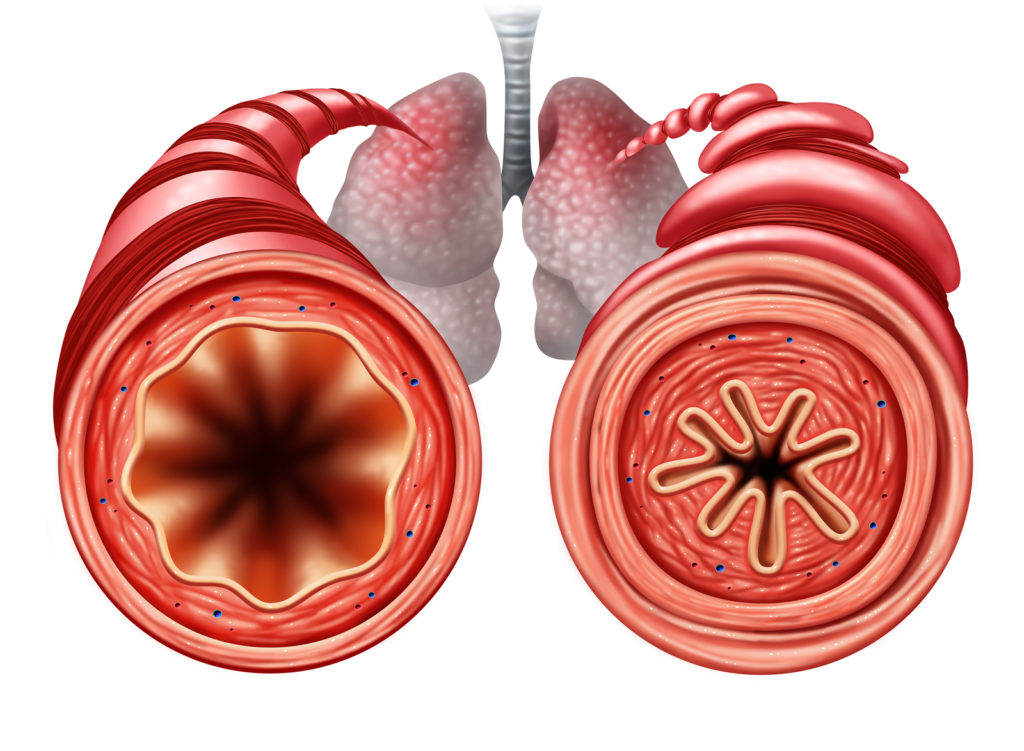By Ladd McNamara, M.D.
Everything on this website is for informational purposes only, and not intended as medical advice. Consult your physician before starting nutritional supplements. Please read the full medical disclaimer via the link in the footer below.
Quality Nutritional Supplements Help Establish and Maintain True Health
 Potent and pure nutritional supplements can reduce the frequency and severity of asthmatic attacks, and have the added benefits of improving one’s overall health. Vitamins, minerals, antioxidants, and omega-3 fatty acids all nourish, protect, and help renew cells throughout our bodies for the maintenance of true health. I have witnessed specific combinations of safe and effective micronutrients reduce the frequency and severity of asthma attacks among patients, as well as many others I have encountered over the past 25 years of working with nutraceuticals (high quality supplements). The problem is, most people purchase their supplements over the counter, and have no idea about the quality. The supplements I use and recommend are not purchased over the counter, and for good reason.
Potent and pure nutritional supplements can reduce the frequency and severity of asthmatic attacks, and have the added benefits of improving one’s overall health. Vitamins, minerals, antioxidants, and omega-3 fatty acids all nourish, protect, and help renew cells throughout our bodies for the maintenance of true health. I have witnessed specific combinations of safe and effective micronutrients reduce the frequency and severity of asthma attacks among patients, as well as many others I have encountered over the past 25 years of working with nutraceuticals (high quality supplements). The problem is, most people purchase their supplements over the counter, and have no idea about the quality. The supplements I use and recommend are not purchased over the counter, and for good reason.
Asthma is a Common and Potentially Fatal Disease
About 1 in 13 people, or about 7% of adults and 8% of children have asthma. Asthma is the most common chronic disease among children, with some individuals experiencing improvements as they become adults. The severity of this disease ranges from a mild nuisance of coughing, especially with exercise, to a disease that interferes with daily activities, and worse — severe attacks, that if untreated may result in death due to swelling of the bronchial tubes closing off air being able to get to the lungs.
Risk Factors for Developing Asthma
- Genetics: having a first-degree relative (parent or sibling) with asthma
- Having an allergy or allergic condition, especially allergic rhinitis (hay fever)
- Being overweight, which may be the first time a person experiences wheezing
- Smoking or second-hand smoke, which irritates the airways, triggering bronchial spasms
- Exposure to high levels of air pollution
- Chronic exposure to household chemical irritants or molds, dust mites, etc.
- Exposure to occupational chemicals as used in farming, hairdressing and manufacturing
Common Triggers for Asthma Attacks
 Exercise, especially while breathing cold air
Exercise, especially while breathing cold air- Emotional stress
- Air pollution
- Cigarette smoke
- Seasonal allergies to pollen
- Droppings from household insects, such as dust mites and cockroaches
- Pet dander
- Exposure to airborne chemicals in the home or workplace
- Viruses: colds and flus
- Sensitivities to food preservatives, such as sulfites
- Sensitivities to certain foods
- Stomach acid reflux (GERD)
- Certain medications, such as beta blockers and Non-Steroidal Anti-Inflammatory Drugs (NSAIDS), such as aspirin, ibuprofen, naproxen, etc.
Quality Micronutrients Can Improve Asthma
 There is no known cure for asthma. However, the frequency and severity of asthmatic attacks can be minimized with either medication or, in my experience in working with patients and many others for the past 25 years, with high-quality nutritional supplements. Severe cases of asthma may require both medication and quality nutritional supplements, but specific nutritional supplements should not be left out of the equation, as they can considerably improve the quality of an asthma sufferer’s life. There are many people who have made certain quality nutritional supplements a part of their daily lives, and no longer require medication for asthma.
There is no known cure for asthma. However, the frequency and severity of asthmatic attacks can be minimized with either medication or, in my experience in working with patients and many others for the past 25 years, with high-quality nutritional supplements. Severe cases of asthma may require both medication and quality nutritional supplements, but specific nutritional supplements should not be left out of the equation, as they can considerably improve the quality of an asthma sufferer’s life. There are many people who have made certain quality nutritional supplements a part of their daily lives, and no longer require medication for asthma.
Of course, a person with asthma must avoid known triggers for their asthma as much as possible. And despite exposure to known triggers, those who follow my nutritional supplement protocol for asthma usually do not experience an asthma attack. (The supplements even reduce allergic reactions to pollen and other substances.) I write about this in more detail on my other membership-based website, the Dr. Ladd VIP Program, where the videos, articles, and supplement protocols are available.
Oxidative Stress and Inflammation Are the Root of Asthma Attacks
 Medical studies have found that it is oxidative stress and inflammation within the lung’s bronchial tubes that trigger asthma attacks. (1) One study confirmed that those with severe asthma have excessive oxidation. (2) Although the authors found that there was not a deficiency in antioxidants (vitamins A and E), they were using measurements below what I consider sufficient. The government daily recommendations are usually minimal recommendations meant to prevent classical diseases, such as scurvy and rickets. Plus, there are many other antioxidants and micronutrients beyond vitamins A and E. The levels and spectrum of antioxidants in my asthma protocol are well above what was ignored in this study.
Medical studies have found that it is oxidative stress and inflammation within the lung’s bronchial tubes that trigger asthma attacks. (1) One study confirmed that those with severe asthma have excessive oxidation. (2) Although the authors found that there was not a deficiency in antioxidants (vitamins A and E), they were using measurements below what I consider sufficient. The government daily recommendations are usually minimal recommendations meant to prevent classical diseases, such as scurvy and rickets. Plus, there are many other antioxidants and micronutrients beyond vitamins A and E. The levels and spectrum of antioxidants in my asthma protocol are well above what was ignored in this study.
Antioxidants Reduce Oxidative Stress, Inflammation, and Asthmatic Attacks
In addition to vitamin A, C, and E, other powerful antioxidants, such as grape seed extract, resveratrol, curcumin (turmeric extract), quercetin, green tea extract, N-acetyl-L-cysteine (precursor to glutathione), beta glucan (from reishi and shiitake mushroom and baker’s yeast extract), and many other micronutrients, have all shown signs of improvements in lung function studies involving asthma. All these micronutrients, individually and more so when used synergistically, help reduce the frequency and severity of asthma attacks. (3 – 14)
 Even melatonin use at night is associated with improvement in asthma symptoms. (15, 16) Melatonin is an antioxidant, and not only helps reduce oxidative stress directly, it also is considered the “master hormone,” and helps induce the secretion of growth hormone during dream state sleep, as well as many other hormones throughout the body that have restorative benefits. And, these benefits include reducing asthma symptoms.
Even melatonin use at night is associated with improvement in asthma symptoms. (15, 16) Melatonin is an antioxidant, and not only helps reduce oxidative stress directly, it also is considered the “master hormone,” and helps induce the secretion of growth hormone during dream state sleep, as well as many other hormones throughout the body that have restorative benefits. And, these benefits include reducing asthma symptoms.
If a person taking quality nutritional supplements (aka, micronutrients) to help prevent or reduce asthma attacks, which is very uncommon if following my protocol, experiences an asthma attack, of course, a bronchodilator inhaler would still be needed to open swollen airways, as supplements cannot act quickly enough to restore airflow in such an emergency.
Quality Supplements Make the Difference For Success
My goal in writing this, is to help people reduce the frequency and severity of asthma attacks by reducing the hyper-responsiveness of the immune system and spasms of bronchial smooth muscles with daily use of safe and effective quality nutritional supplements that also benefit the whole body.
However, the key to success for any of my protocols is in choosing high quality, pure and potent nutritional supplements. Most people purchase cheap supplements, not knowing what actually is in the tablets or capsules. What is states on the label is not necessarily in the bottle. The potency and purity is most often not what you would expect, which is why most people do not have the life-changing experience from taking nutritional supplements that I write about, and have seen with the use of high quality supplements.
Conclusion
 Asthma is a common chronic, potentially-lethal reactive airway disorder among both children and adults. Although many medications exist to manage asthma attacks, the medical literature supports the use of various nutritional supplements for reducing the incidence and severity of asthma attacks. Quality nutritional supplements, i.e., potent and pure micronutrients, in proper ratios and balance, reduce the frequency and severity of asthmatic attacks, as well as allergies. And, anyone suffering from asthma should consider taking quality supplements, and consider the protocol I have for this disease.
Asthma is a common chronic, potentially-lethal reactive airway disorder among both children and adults. Although many medications exist to manage asthma attacks, the medical literature supports the use of various nutritional supplements for reducing the incidence and severity of asthma attacks. Quality nutritional supplements, i.e., potent and pure micronutrients, in proper ratios and balance, reduce the frequency and severity of asthmatic attacks, as well as allergies. And, anyone suffering from asthma should consider taking quality supplements, and consider the protocol I have for this disease.
Everything on this website is for informational purposes only, and not intended as medical advice. Consult your physician before starting nutritional supplements. Please read the full medical disclaimer via the link in the footer below.
Please see the Dr. Ladd VIP Program, where the videos, articles, and supplement protocols are available. Subscribed members also have access to the Dr. Ladd VIP Facebook group for ongoing support, which also serves as a virtual archive of prior searchable questions and replies on health topics.
References
- Qu J, et al. Recent developments in the role of reactive oxygen species in allergic asthma. J Thorac Dis. 2017 Jan;9(1):E32-E43.
- Bishopp A, et al. Biomarkers of oxidative stress and antioxidants in severe asthma: A Prospective Case-Control Study. Ann Allergy Asthma Immunol. 2017 Apr;118(4):445-451.
- Wu YM, et al. Comparable Function of γ-Tocopherols in Asthma Remission by Affecting Eotaxin and IL-4. Adv Clin Exp Med. 2016 Jul-Aug;25(4):643-8.
- Zhou DY, et al. Proanthocyanidin from grape seed extract inhibits airway inflammation and remodeling in a murine model of chronic asthma. Nat Prod Commun. 2015 Feb;10(2):257-62.
- Lee T, et al. Grape seed proanthocyanidin extract attenuates allergic inflammation in murine models of asthma. J Clin Immunol. 2012 Dec;32(6):1292-304.
- Hu X, et al. Resveratrol induces cell cycle arrest and apoptosis in human eosinophils from asthmatic individuals. Mol Med Rep. 2016 Dec;14(6):5231-5236.
- Ni ZH, et al. Resveratrol inhibits mucus overproduction and MUC5AC expression in a murine model of asthma. Mol Med Rep. 2016 Jan;13(1):287-94.
- Townsend EA, Emala CW Sr. Quercetin acutely relaxes airway smooth muscle and potentiates β-agonist-induced relaxation via dual phosphodiesterase inhibition of PLCβ and PDE4. Am J Physiol Lung Cell Mol Physiol. 2013 Sep;305(5):L396-403.
- Yang X, et al. Curcumin reduces lung inflammation via Wnt/β-catenin signaling in mouse model of asthma. J Asthma. 2017 May;54(4):335-340.
- Wang W, et al. Enhanced bioavailability and efficiency of curcumin for the treatment of asthma by its formulation in solid lipid nanoparticles. Int J Nanomedicine. 2012;7:3667-77.
- Kazaks AG, et al. Effect of oral magnesium supplementation on measures of airway resistance and subjective assessment of asthma control and quality of life in men and women with mild to moderate asthma: a randomized placebo controlled trial. J Asthma. 2010 Feb;47(1):83-92.
- Burg AR, et al. Orally administered β-glucan attenuates the Th2 response in a model of airway hypersensitivity. 2016 Jun 21;5(1):815.
- Sarinho E, et al. Production of interleukin-10 in asthmatic children after Beta-1-3-glucan. Allergol Immunopathol (Madr). 2009 Jul-Aug;37(4):188-92.
- Kawashima S, et al. β-glucan curdlan induces IL-10-producing CD4+ T cells and inhibits allergic airway inflammation. J Immunol. 2012 Dec 15;189(12):5713-21.
- Habtemariam S, et al. Melatonin and Respiratory Diseases: A Review. Curr Top Med Chem. 2017;17(4):467-488.
- Shin IS, et al. Melatonin reduces airway inflammation in ovalbumin-induced asthma. 2014 Dec;219(12):901-8.



